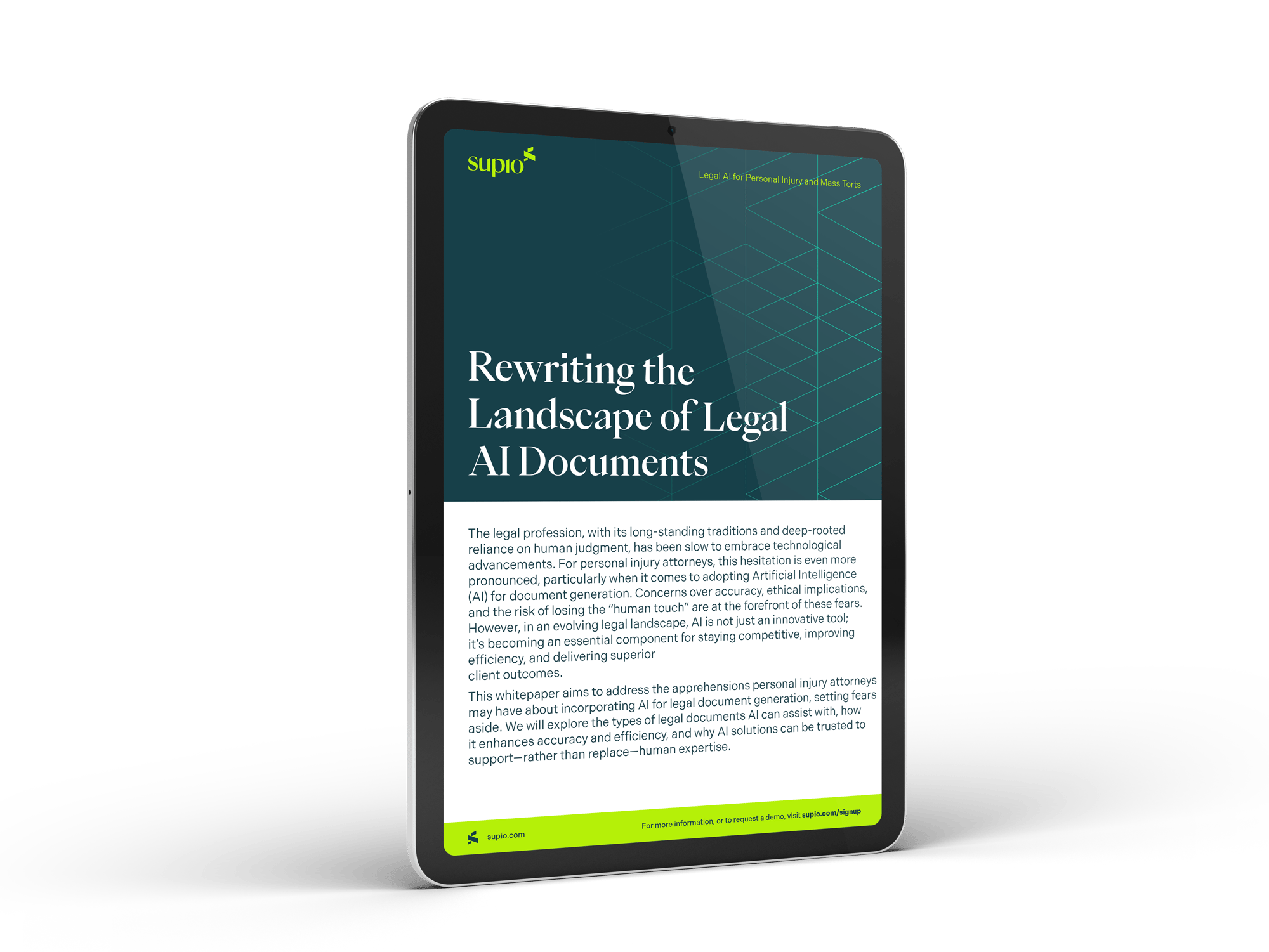
Rewriting the Landscape of Legal AI
The legal profession, with its long-standing traditions and deep-rooted reliance on human judgment, has been slow to embrace technological advancements. For personal injury attorneys, this hesitation is even more pronounced, particularly when it comes to adopting Artificial Intelligence (Al) for document generation. Concerns over accuracy, ethical implications, and the risk of losing the "human touch" are at the forefront of these fears. However, in an evolving legal landscape, Al is not just an innovative tool; it's becoming an essential component for staying competitive, improving efficiency, and delivering superior client outcomes.
This whitepaper aims to address the apprehensions personal injury attorneys may have about incorporating Al for legal document generation, setting fears aside. We will explore the types of legal documents Al can assist with, how it enhances accuracy and efficiency, and why Al solutions can be trusted to support-rather than replace-human expertise.
Understanding the Hesitations Around AI
Accuracy and Reliability
Lawyers are concerned that Al-generated documents may not be accurate or may miss critical nuances that only a trained legal mind could catch.
How can you trust it?
The Supio Al does the majority of the work in generating these legal outputs, however, there is a team of medical and legal experts who QA every document to ensure that the information is correct.
Loss of Human Element
Legal advocacy often involves empathy and emotional intelligence, especially in personal injury cases. Attorneys worry that Al-generated documents might feel impersonal or lack the empathy required to resonate with clients, opposing parties, or juries.
How can you trust it?
Supio's Al is trained based on your specifications and templates. When you onboard with Supio, you provide example outputs like past demand letters, so the final deliverable is at the same human-like standards you are accustomed to creating.
Ethical Considerations
The practice of law is bound by strict ethical standards. Attorneys fear that relying on Al could lead to a breach of client confidentiality or missteps in legal protocols.
How can you trust it?
The Supio Al is not only HIPAA certified, but also built on Azure and monitored 24/7 by Vanta to ensure that all of your client's data is secure.
Risk of Liability
There is concern that if an Al-generated document contains an error, the responsibility may fall on the attorney, thus increasing liability risks.
How can you trust it?
As mentioned previously, Supio's outputs are QAd by humans but as a lawyer you should always use proper legal judgment for anything with your name on it and make sure it is 100% to your standards. Supio will make any requested changes, or you can use Supio's dynamic drafting on your own.
While these fears are understandable, they are based on common misconceptions about how Al functions in the legal world. Rather than being a replacement for human judgment, Al is a tool that enhances the capabilities of legal professionals, allowing them to focus on higher-level tasks while automating time-consuming processes.
The Case for Trusting AI in Legal Document Generation
Accuracy Through Learning and Data Analysis
Al can analyze vast amounts of legal data, precedent, and language, allowing it to produce documents that are accurate and tailored to the case's needs. Al solutions are trained on legal datasets and can be further fine-tuned with human oversight. This means that while an Al system may generate the initial draft, attorneys still can review, edit, and approve the final product-ensuring quality control and accuracy.
Ethical AI Practices
Leading Al document generation tools are built with ethical considerations in mind. Confidentiality is a priority, with Al platforms designed to protect sensitive client information through encryption and secure cloud environments. Furthermore, these tools adhere to the legal standards and ethical guidelines outlined by bar associations, ensuring that Al-generated documents maintain professional integrity.
Time and Efficiency Gains
Al-powered document generation allows attorneys to focus on more strategic and client-facing work. What used to take hours can now be accomplished in minutes.
Whether it's creating a demand letter, preparing a deposition summary, or drafting email communications, Al enables lawyers to generate comprehensive documents quickly, thus freeing up valuable time for deeper case analysis and client engagement.
Human-AI Collaboration
The key to effective Al adoption is collaboration between the attorney and the Al tool. Al is excellent at automating repetitive tasks and generating drafts based on legal templates and input data. However, attorneys remain in full control of the process, fine-tuning the output and adding their legal mind, unique insights, empathy, and strategic direction to each document. This approach ensures that the human element is preserved, while Al takes care of the mechanical aspects.
AI-Generated Legal Outputs for Personal Injury Attorneys
-
Demand Letters
Drafting persuasive demand letters can be time-consuming, especially when attorneys need to tailor each one to reflect specific case details. Supio's Al can help create well-structured and compelling letters that incorporate legal facts, client medical history, and settlement demands, saving significant time without sacrificing quality.
-
Plaintiff Fact Sheets for Mass Torts
In mass tort cases, plaintiff fact sheets are essential for gathering and organizing information about large numbers of clients. Supio's Al can streamline this process by generating these documents quickly and accurately, ensuring that all relevant details are captured and presented in a standardized format.
-
Deposition Summaries
Reviewing deposition transcripts is often tedious and time-consuming.
Al can help by drafting depositions, creating summaries, extracting key points, and presenting the data in an organized manner for quick reference, giving attorneys more time to focus on strategy.
-
Email Communication
Supio's Al Assistant can help draft email communications with specifics from your case, ensuring professionalism and consistency in correspondence with clients, opposing counsel, or the courts.
-
Opening and Closing Arguments
While Al won't replace the art of oral advocacy, it can assist attorneys in generating outlines and drafting portions of opening and closing arguments. These Al-generated drafts can be a starting point, providing attorneys with structured, legally sound content that they can refine and customize for delivery.
Overcoming the Fear of AI in Legal Practice
Adopting Al does not mean relinquishing control or compromising on the quality of legal work. On the contrary, Al tools like Supio are designed to support attorneys, making their work more efficient, thorough, and client focused. The fear of Al should not be a barrier to benefiting from its advantages.
Maintain Control
Attorneys always have the final say in any document produced by Al. The role of Al is to assist in generating drafts and templates that save time, while attorneys review, refine, and ensure that the documents meet the high standards of the profession. Supio is a partner to ensure they have less work to do in the process.
Mitigate Risk with AI
A common fear about Al is that it can increase risk. While Al can help mitigate it. By automating repetitive tasks and reducing the likelihood of human error, Al tools enhance accuracy and consistency, especially for standard documents like demand letters and fact sheets.
Scalability
Al allows personal injury attorneys to scale their practice more effectively. Whether handling a high volume of mass tort cases or individual claims, Al can produce documents more efficiently, allowing attorneys to take on more clients without compromising quality.
Embracing AI for a Competitive Advantage
Al is reshaping the future of the legal profession, offering personal injury attorneys the tools to improve efficiency, reduce errors, and scale their practices. While some may be hesitant to embrace this technology, the benefits of Al-assisted document generation-such as accuracy, time savings, and improved client service-far outweigh the risks. Attorneys who trust Al to handle routine tasks can focus on what they do best: advocating for their clients and achieving the best possible outcomes.
The legal landscape is changing, and Al is an essential part of that transformation. By understanding how Al works and embracing it as a tool for enhancing, not replacing, human judgment, personal injury attorneys can stay ahead in an increasingly competitive market.

